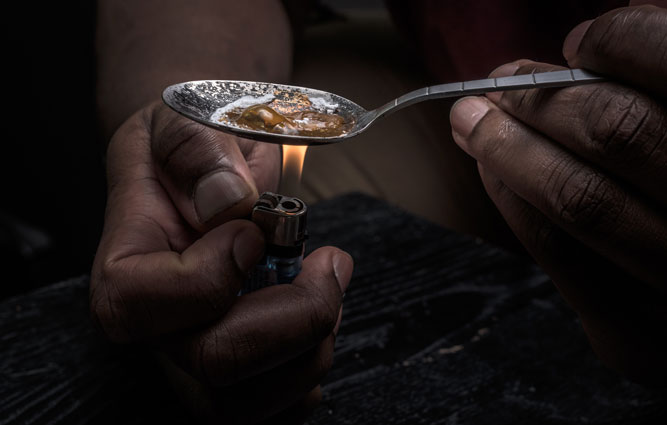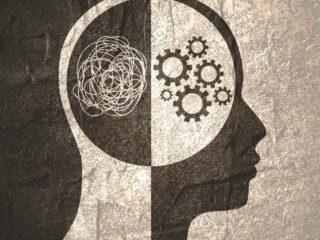The United States is experiencing an opioid crisis and one of the most popular forms of opioids doesn’t come from a doctor but a dealer – heroin. When many users lose access to prescription opioids or prescription users want something more powerful they turn to heroin. It’s cheap, it’s powerful, and it’s available.
There isn’t such thing as a casual or social heroin user – heroin is simply too addictive and powerful to be used ‘in moderation.’ Most heroin addicts will develop several physical, psychological, and behavioral symptoms that come with this powerful addiction, signs, and symptoms you should be on the lookout for if you fear someone close to you has a problem. By exploring seven signs of heroin addiction we can help you piece together what addiction looks like – and how to get help.
What a Heroin ‘High’ Looks Like
Can you tell someone is on heroin as easily as you can tell someone’s drunk? Not always. Heroin is a very powerful drug which means the high will be difficult to hide but the high is typically short-lived. If you believe someone is using heroin look for these symptoms:
- Euphoria – A user who has just consumed heroin will often experience extreme euphoria.
- Runny Nose – Heroin users have continuous runny noses with no other symptoms
- Clouded Thoughts – Addicts may have trouble forming coherent thoughts and sentences
- Drowsiness – The user may fade in and out of consciousness
- Constipation – Heroin can slow down and hinder the GI system. You can’t see it, but most users will complain about the condition
- Scratching and Itching – A hallmark sign of an opioid high. Users will scratch all over.
- Overall Droopiness – Does the person seem to sink into the furniture or slouch around?
- Flushed Skin
Heroin Withdrawal
One of the most obvious signs of heroin addiction is heroin withdrawal, more popularly known as dope-sickness. Users addicted to any opioid like heroin will experience severe withdrawal symptoms once heroin has left their system. These symptoms aren’t life-threatening but can be torturous for the person detoxing. Symptoms of heroin detox include:
- Fever
- Sweating
- Nausea and vomiting
- Sleeplessness
- Severe aches and pains, especially in joints
- Anxiety
- Runny nose
- Depression
- Many more
Suspicious Items
Heroin can be consumed in many ways, but most utilize paraphernalia to help the user get to the drug more effectively. If you’ve noticed suspicious items in a loved one’s room it could be a sign of heroin addiction. Items associated with heroin include light bulbs, syringes, tourniquets (often belts), spoons, foil, small baggies, lighters, pipes, and more. It’s not uncommon to see a spoon and lighter in a room but if you find these items together it’s clear what they’re being utilized for.
Sudden Personality Changes
Is your previously successful and driven college student now having trouble passing their classes? Is your normally loving spouse putting distance between the two of you or otherwise avoiding you? Heroin impacts every part of a person’s life including their mood and personality. Heroin often comes with sudden shifts in personality including higher highs and lower lows, changes in goals and motivation, loss of enthusiasm, an influx of deceit or lies, and mood swings.
In most circumstances, a heroin addict will be high on heroin or experiencing withdrawal. Someone who is only concerned with being high or getting high again will not be the same person they were before. Heroin can take your personality along with your life. A sudden personality change isn’t an immediate sign of heroin addiction but almost all addicts display this extreme shift.
Sudden Criminal Problems
It is not normal for someone with a clean past to suddenly engage in criminal behavior. Sudden criminal problems and behavior are often caused by drug abuse and addiction. Theft, breaking and entering, possession, trespassing, and more crimes are associated with heroin use. People don’t suddenly become criminals overnight because they just want to, they turn to crime out of necessity. Unfortunately, that’s how addictive the drug can be.
Most of the crimes that come with a heroin addiction are rooted in the next sign of addiction.
Sudden Financial Problems
Like sudden criminal problems, sudden financial problems are normally a sign that something has gone wrong. Heroin isn’t the most expensive drug but it’s not free. A user with a chronic addiction will do everything they can to get their fix. Most addicts will start by selling their own possessions – even cherished items. It doesn’t matter if it can help get you high. After the user has run out of items of their own to sell they will turn to friends and family members. Once they’ve been found out by friends and family an addict may turn their addictive behavior to the world at large, leading to criminal problems.
Overall Health Decline
Heroin addiction may be difficult to recognize at first, but the addict will only decline. After continued abuse, all addicts will show signs of health decline in unhealthy weight gain or loss, changes in sleep patterns, a decline in physical appearance and self-care, and other health declines. Repeated intravenous use can collapse veins and can cause track marks. If you suspect someone is addicted to heroin and experiencing a sudden health decline its best to reach out before it’s too late.
Getting Help
Heroin addiction never ends well. The two most common final destinations for untreated heroin addiction are prison and in the cemetery. If you or someone you love is addicted to heroin you must reach out before the inevitable happens.
Modern heroin addiction treatment facilities attack the addiction in a safe and comfortable environment. Treatment facilities both help the user flush heroin from their body in a safe way and teach them the best ways to remain heroin free. To get this treatment started it only takes one phone call.







